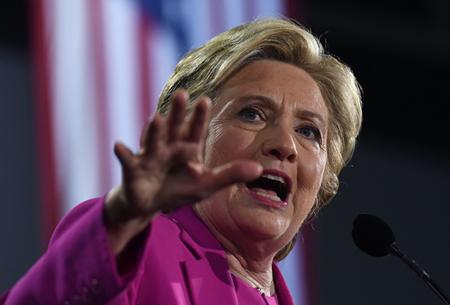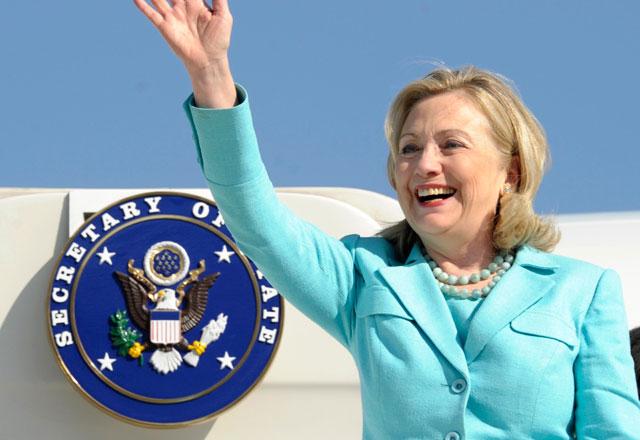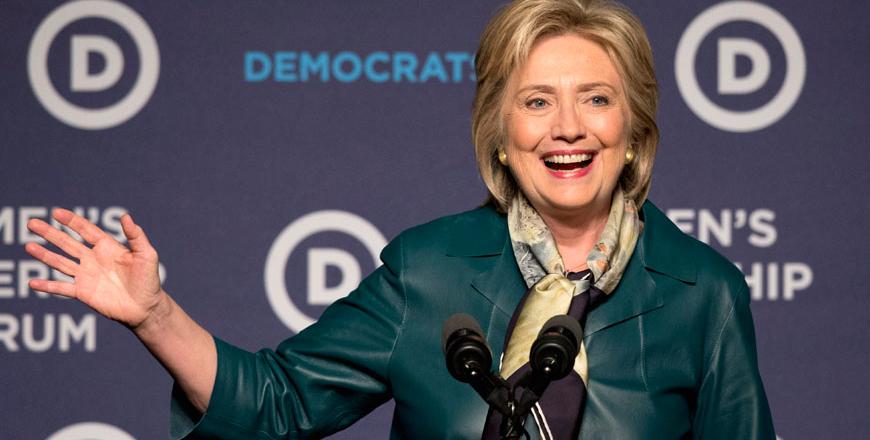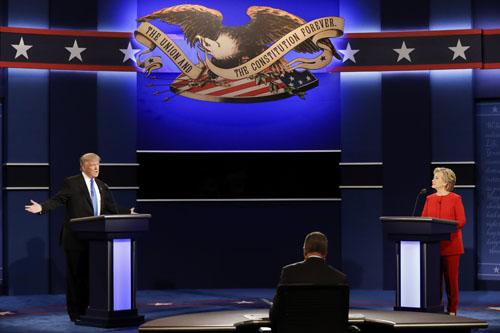You are here
Clinton a polarising trailblazer, with White House in sight
By Reuters - Nov 07,2016 - Last updated at Nov 07,2016

US Democratic presidential nominee Hillary Clinton speaks during a campaign rally in Raleigh, North Carolina, on November 3 (AFP photo)
WASHINGTON — Hillary Clinton has one of the strongest resumes of anyone ever to run for US president, with stints as first lady, senator and secretary of state, but she is also a polarising figure and a Washington insider with decades of political baggage.
Should Democrat Clinton, 69, defeat Republican Donald Trump, 70, in Tuesday's election, she would become the first woman elected US president, having already been the only first lady to win elected office and the first woman nominated for president by a major US party.
Clinton fell short in her first presidential bid in 2008, losing her party's nomination to Barack Obama.
Her time on the American political scene has come during an era of intense partisanship and gaping divisions in US society. Americans hold dramatically differing views of Clinton.
Clinton's admirers consider her a tough, capable and sometimes inspirational leader who has endured unrelenting efforts by political enemies to chop her down. Her detractors consider her an unscrupulous and power-hungry opportunist.
Clinton entered the 2016 race as her party's odds-on favourite, but was perceived as an establishment figure and the ultimate insider at a time when voters seemed enamored with outsiders. She staved off an unexpectedly stiff challenge from US Senator Bernie Sanders, who describes himself as a democratic socialist, to claim the Democratic nomination in July.
For decades Clinton has battled conservatives and Republican adversaries and weathered controversies including her husband Bill Clinton's infidelity, a failed Republican effort to remove him from office, investigations into past business dealings and her use of a private e-mail server as secretary of state.
She famously complained in 1998 during her husband's presidency about a "vast right-wing conspiracy".
Many Democrats back her for championing women's rights at home and abroad, social justice and access to healthcare, but opinion polls show a majority of US voters do not trust her.
Against Trump, she portrayed her candidacy as a bulwark against a unique threat that she said the real estate developer posed to American democracy.
As President Obama's secretary of state from 2009 to 2013, she grappled with civil wars in Syria and Libya, Iran's nuclear programme, China's growing clout, Russian assertiveness, ending the Iraq war, winding down the Afghanistan war, and an unsuccessful bid to settle the Israeli-Palestinian conflict.
Clinton was already running for president when, during a testy 11-hour congressional hearing in October 2015, she deflected Republican criticism of her handling of a 2012 attack by militants in Benghazi, Libya, in which the US ambassador died.
That hearing and another in January 2013 while she was still secretary of state focused on allegations of State Department security lapses related to the attack.
'What to make of me'
A mistrust of rivals and the media has long prompted Clinton to keep her guard up.
"The truth is, through all these years of public service, the 'service' part has always come easier to me than the 'public' part," Clinton said in accepting the 2016 Democratic nomination. "I get it that some people just don't know what to make of me."
At the same convention, Obama cited her years of experience and said, "There has never been a man or woman, not me, not Bill — nobody more qualified than Hillary Clinton to serve as president of the United States."
Republicans have accused Clinton of breaking the law while corresponding through a private e-mail server as secretary of state. In July, FBI Director James Comey called Clinton "extremely careless" in her handling of classified information by e-mail, but Obama's Justice Department accepted his recommendation not to bring criminal charges.
"If I had to do it over again, I would, obviously, do it differently," Clinton said during a September 26 debate with Trump, referring to her use of the private server as a "mistake" for which she took responsibility.
The controversy flared again on October 28, 11 days before the election, when Comey told US lawmakers the FBI was investigating a new trove of e-mails as part of its probe.
On Sunday, Comey said the FBI found nothing in those e-mails to change the agency's July decision not to bring charges against Clinton, lifting a cloud over her campaign just two days before the election.
Trump seized on the probe into Clinton's e-mail, deriding her as "Crooked Hillary", saying he would seek to put her behind bars if elected and encouraging his supporters to chant "lock her up".
Clinton portrayed Trump as a racist hate-monger, a sexist and a tax-dodger enamored with Russian President Vladimir Putin and unfit to serve as president and commander in chief.
"Such a nasty woman," Trump retorted during their October 19 debate when she suggested he would try to get out of paying the higher taxes she advocates for the wealthy.
Midwestern roots
Born in Chicago on October 26, 1947, Hillary Rodham Clinton was the eldest of three children of a small-business owner father she called a "rock-ribbed, up-by-your-bootstraps, conservative Republican" and a mother who was a closet Democrat.
She said she inherited her father's distinctive laugh — she called it "a big rolling guffaw" — and Americans have heard it frequently.
She attended public schools, then enrolled in 1965 at all-female Wellesley College in Massachusetts, where she headed the Young Republicans Club.
In a Wellesley commencement address, she seized the spotlight by starting her speech with extemporaneous remarks challenging comments made by the preceding speaker, a US senator.
Her political views changed during the 1960s civil rights struggles and Vietnam War escalation. She attended the 1968 Republican convention that nominated Richard Nixon, but soon became a Democrat.
At Yale Law School, she met a similarly ambitious fellow student from Arkansas, Bill Clinton, and they became a couple. She moved to Washington to work for a congressional panel in the impeachment drive against Nixon, who resigned as president in 1974 during the Watergate scandal.
She moved to Arkansas to be with Bill, married him in 1975, and was hired by a top law firm. He jumped into politics, eventually being elected governor, at age 32, in 1978. She gave birth to the couple's only child, daughter Chelsea, in 1980.
As Arkansas' first lady, she was a high-powered lawyer in the capital Little Rock and a Wal-Mart corporate board member.
Most Americans were introduced to her during her husband's bid for the 1992 Democratic presidential nomination. Bill Clinton said voters would get "two for the price of one" if they elected him. She unapologetically said she was not a woman who "stayed home and baked cookies".
After a woman named Gennifer Flowers accused Bill Clinton during the campaign of a sexual affair, Hillary Clinton appeared on TV with her husband and referred to singer Tammy Wynette's song, "Stand by Your Man".
"You know, I'm not sitting here, some little woman standing by my man like Tammy Wynette," she said, adding that she loved and respected her husband. "And you know, if that's not enough for people, then heck, don't vote for him," she added.
Conservative critics painted her as a radical feminist and a threat to traditional family values.
White House controversies
Bill Clinton defeated incumbent Republican President George H.W. Bush in November 1992. As first lady from 1993 to 2001, she was unusually exertive, diving into policy matters unlike many of her predecessors.
Critics assailed her failed effort to win congressional passage of healthcare reform, deriding it as "Hillarycare".
At a 1995 UN conference in China on women, she declared that "human rights are women's rights and women's rights are human rights".
She and her husband faced a long investigation into past business dealings but ultimately no criminal charges were brought. A real estate venture known as Whitewater faced scrutiny, spawning an independent counsel investigation that later encompassed Bill Clinton's sexual relationship with a White House intern named Monica Lewinsky.
Deputy White House Counsel Vince Foster, a figure in the Whitewater controversy and a close friend of the Clintons from Arkansas, was found dead of a gunshot in 1993. His death was ruled a suicide. In a 2003 memoir, Hillary Clinton blasted "conspiracy theorists and investigators trying to prove that Vince was murdered to cover up what he 'knew about Whitewater'."
In 2000, the independent counsel investigation concluded there was insufficient evidence to show the Clintons had been involved in any criminal behavior related to Whitewater.
In December 1998, the Republican-led House of Representatives voted to impeach a president for only the second time in US history, charging Bill Clinton with "high crimes and misdemeanors" for allegedly lying under oath and obstructing justice to cover up his relationship with Lewinsky.
The Republican-led Senate acquitted Clinton in February 1999. Hillary Clinton called the impeachment an abuse of power by Republicans with a "Soviet-style show trial" and condemned what she called "an attempted congressional coup d'etat".
She also said she "wanted to wring Bill's neck" for the affair and upbraided him privately. Ultimately, she said, she decided she still loved him and remained after they went through counselling.
"All I know is that no one understands me better and no one can make me laugh the way Bill does," she wrote in her 2003 book "Living History".
Hillary Clinton soon launched her own bid for elected office. She bought a house in the town of Chappaqua to officially become a New York resident. She won election as a US senator the same month her husband left office in January 2001. She served until 2009.
She entered the race for the 2008 Democratic presidential nomination as the front-runner, but then-senator Obama won the party's nomination and beat Republican John McCain to become the first black president.
In 2016, Obama campaigned vigorously for her against Trump.
"What sets Hillary apart is that through it all, she just keeps on going, and she doesn't stop caring, and she doesn't stop trying. And she never stops fighting for us, even if we haven't always appreciated it," Obama told a September rally.
Related Articles
Hillary Rodham Clinton has jumped back into presidential politics, making a much-awaited announcement she will again seek the White House in 2016 with a promise to serve as the "champion" of everyday Americans in a country with growing income inequality.
ALEXANDRIA, United States — It's been a great week for Hillary Clinton.First, Democratic rival Joe Biden abandoned his presidential dreams.
HEMPSTEAD, New York — Republican Donald Trump vowed on Tuesday to hit rival Democrat Hillary Clinton harder in the next US presidential deba


















